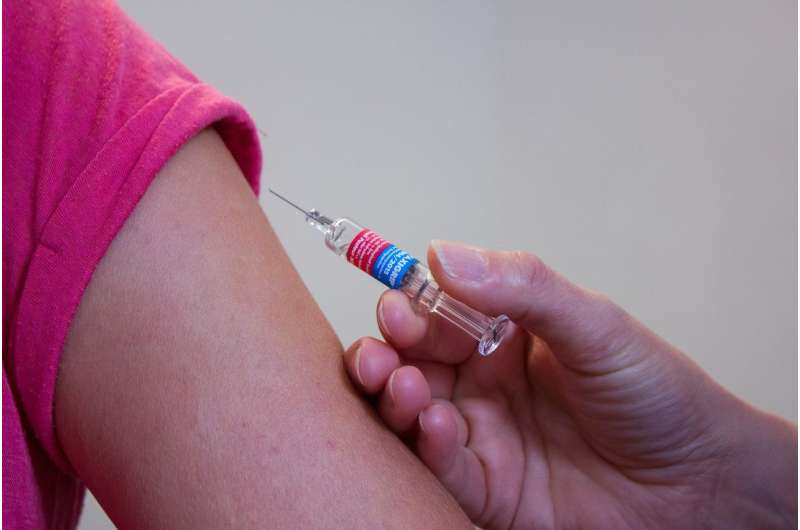Mandatory vaccinations not the answer to boosting uptake among NHS staff

Just one in six (18%) healthcare workers thought mandatory vaccinations were the best solution to encourage more frontline staff to have a Covid-19 jab, finds new research led by UCL and the University of Leicester.
As part of the UK-REACH longitudinal study, researchers carried out a survey of over 3,200 NHS healthcare workers, to understand how they felt about mandatory vaccinations, and find out what solutions they may have to address the problem of under-vaccination among colleagues.
The research was triggered by the UK Government's controversial decision (since dropped) to make it a legal requirement for all NHS workers, in face-to-face patient roles, to be double vaccinated by April 1st, 2022, or risk losing their job.
Published in the Lancet's eClinicalMedicine, the findings show that more than three quarters (77%) of healthcare workers preferred another solution to mandatory vaccinations, and the remaining 5% said they didn't know what the best thing to do was.
The most popular alternative to mandatory vaccinations was 'education and support', proposed by one in three (32%) healthcare workers. This group thought people should be helped to understand the benefits of vaccination and encouraged to take up the vaccine.
Another one in six (18%) felt it was up to individuals to decide whether or not to get vaccinated. Some of this group specifically said it was against people's human rights to make them get vaccinated.
Lead author, Katherine Woolf, Professor of Medical Education Research at UCL Medical School, said: "Our survey provides the only available data and insight about what healthcare workers think about mandatory Covid-19 vaccinations.
"It shows that engaging and educating the NHS workforce is essential to building more trust in vaccination, which remains the most important tool we have to combat Covid-19 infection.
"But forcing frontline staff, particularly those who are hesitant, could cause serious mistrust and backfire, lowering morale and leading to thousands of great doctors and nurses leaving the profession."
The UK-Reach (United Kingdom Research study into Ethnicity And COVID-19 outcomes in Healthcare workers) study is the largest and most comprehensive research project assessing the risk of Covid-19 for 18,000 clinical and non-clinical staff. It was launched after growing evidence showed how people from ethnic minority backgrounds had double the risk of severe Covid-19 infection compared to that of the White population.
This latest sub-study also found healthcare workers who were hesitant about vaccination and/or who were unvaccinated against flu, were much less likely to favour mandatory vaccination, as were female staff, staff from Black ethnic groups, and staff in allied health professions.
Professor Woolf, Co-Investigator for the UK-REACH study, added: "Our research shows that had a mandatory vaccination policy been implemented, it would have been viewed especially negatively by the people it most targeted; those who are hesitant about getting vaccinated.
"Staff who are forced to get vaccinated when they don't want to, are unlikely to tell patients and their communities that vaccination is a good idea.
"Furthermore, an increase in mistrust among staff from ethnic minority groups, who are most likely to be hesitant about vaccines, could exacerbate existing health and social inequalities in those groups.
"However, if we encourage and support them so they believe that vaccination is safe, effective and worthwhile, they will pass this message on. This matters because healthcare staff are an important source of information and advice about vaccination for patients."
Co-author and Chief Investigator of UK-REACH, Dr. Manish Pareek, Associate Professor of Infectious Diseases, University of Leicester, said: "Vaccines remain important and getting as many frontline healthcare workers fully jabbed is a priority.
"Our findings show that engaging with staff and understanding their views is key.
"Mandatory vaccines may actually worsen other aspects of our engagement with staff (and disproportionately affect certain groups).
"More broadly, these latest results from UK-REACH highlight the power and impact of the UK-REACH cohort to answer policy-relevant questions at speed."
The UK Government's proposed 'vaccination as a condition of deployment' (VCOD) requirements were highly contentious, both morally and ethically, and came under criticism from a number of Royal Colleges, medical and nursing groups.
Had the VCOD policy remained it would have meant that by 3rd February, 2022 any frontline healthcare worker in England would have needed to have had at least one vaccine, to ensure they had time to receive a second jab by 1st April.
It was estimated around 5% (80,000) of health care workers would have remained unvaccinated and NHS Trusts stood to lose thousands of frontline staff.
Thousands of care home staff left the profession in November last year when rules changes meant that only those fully vaccinated could enter care homes.
What the paper does not say:
It does NOT say that 82% of NHS staff are against mandatory vaccination. It says most of the respondents preferred an alternative solution (mostly educate and support).
More information: Katherine Woolf et al, Healthcare workers' views on mandatory SARS-CoV-2 vaccination in the United Kingdom: findings from the UK-REACH prospective longitudinal cohort study, EClinicalMedicine (2022). DOI: 10.1101/2022.01.11.22269017





















